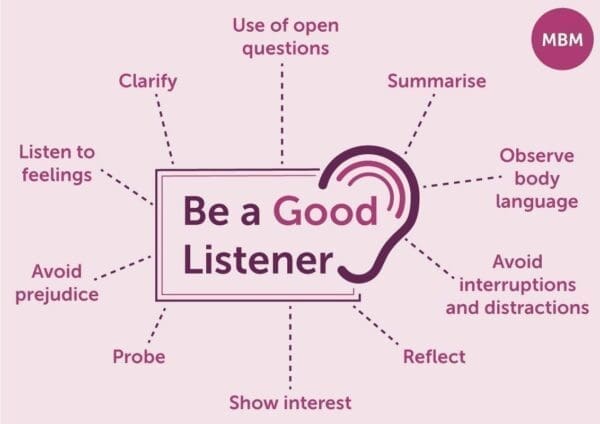Knowing Me, Knowing You, Aha
Listening skills have gained fresh importance in the pandemic. People working from home (WFH), or self-isolating because they’ve been ‘pinged,’ are likely to feel cut off. Also, with offices reopening, many workers don’t want to return full-time. They’d prefer flexibility. Listening to team members in such situations is important in engaging them and keeping them motivated.
In this article, we consider what listening is and why we do it. We explore what good listening skills are, including active listening, and the benefits they bring. We look at how anxiety and other personal issues can impact our listening skills, especially after months of lockdown.
As we’ve seen, furloughing people or making them redundant is hard on managers and leaders too. So we end by looking at how deep listening helps when things are tough. But don’t give up. If you lose your job, listening skills will also help you get back on your feet.
Listen to This – I Think You’ll Find it Useful
What’s the Point of Listening?
In business much of our listening is transactional. We listen to gain information, as the basis for making decisions. Or we’re offering someone a proposition and want to gauge their response. Listening can also be critical – not to make specific decisions, but evaluate and analyse interesting learnings. Think webinars or research presentations.
Listening is also social. Working from home, field-based or in the workplace, we’re social creatures. We need contact and connection. Listening enables us to demonstrate we’re paying attention to people’s thoughts, feelings and behaviours. And crucially, show we empathise. Listening is vital in establishing communication and maintaining productive relationships.
Interestingly, Carl Rogers, the father of humanistic psychotherapy, reckons listening needs to be done in an active manner. He considers sensitivity, empathy and attention to the client (his word) are essential characteristics for therapists. The same characteristics come in handy in business, too!
Listening Skills in Sales
Salespeople focus on the pitch and getting the deal. But the most effective ones know listening is the most important part of the job. Speaking with the customer, the better your listening skills, the better your sales will be. You win more deals. And your negotiations are more enjoyable and feel like you’re creating something together. It’s the same for business leaders. Successful ones listen to their people and understand them. They validate them and empathise. And they do it through listening.
Sticky Learning ® is 7 times more effective than 1-day training courses. Plus, you will get a Chain of Evidence proving your Return on Investment. Discover soft skills training that changes behaviours long term.

Bad Listening’s Funny When it Goes Wrong
Good listening in sales, marketing, the C-suite or wherever involves self-awareness. So take the opportunity to give your listening skills a quick check and stay focused. Bad listeners at work are the stuff of comedy. They’re often painfully funny. Don’t let the joke be on you!
Alan Partridge, Steve Coogan’s spoof talk show host, insults his guests and humiliates himself. And David Brent, Ricky Gervais’ dreadful middle manager from The Office is equally bad, full of self-delusions. Better listening would help them both. We’ll come back to self-awareness because it’s at the heart of being a good listener.

What Advantages Does Listening Bring?
Listening helps you to:
- Understand better and make valid connections between ideas and information.
- Change perspectives and challenge assumptions.
- Boost people’s self-esteem.
What’s the Difference Between Listening and Hearing?
Hearing implies passively perceiving sounds. It’s accidental, involuntary, and effortless.
Listening involves understanding information, through active involvement with mind and body. It’s focused, voluntary, and intentional.
When people at work don’t listen to each other, they find it hard to get things done. Trust gets broken, resentments build. To build effective communication, an important first step is to defuse the situation and find solutions to problems.
Barriers to Effective Listening

What’s Stopping You Being a Good Listener?
Common failings include:
- Being distracted by the thought of other things you should be doing.
- Focusing on the point you want to make, not what the other person’s saying.
- Being impatient to see if the person shares your viewpoint, not taking notice of what they’re saying now.
- Interrupting the other person to put them right.
- The situation is making you anxious.
You can improve how you manage all these points by applying self-awareness. That includes managing anxiety. We’ll talk more about anxiety later.
What are the Three Core Qualities of a Good Listener?
Good listeners are:
- Attentive.
- Non-judgemental.
- Non-interrupting – especially when you disagree with what’s being said!
What Kinds of Listening are There?
The three main types of listening that are most common in interpersonal communications are:
- Informational listening: listening to learn.
- Critical listening: listening to evaluate and analyse.
- Therapeutic or empathetic listening: listening to understand feeling and emotion.
There’s a fourth type of listening that underpins all these, which you hear a lot about. It’s called active listening.
What is Active Listening?
Active listening is essentially the same thing as being a good listener. It means having effective listening skills and using them to the full. Active listening is a way of listening and responding to another person that improves mutual understanding. You use all your senses, concentrating on what’s being said, rather than passively ‘hearing’ the speaker’s message.
Self-Awareness in Listening Skills
We mentioned Alan Partridge and David Brent earlier. They’re funny because they’re blatantly not self-aware. This makes them hilariously bad listeners. By becoming more self-aware and recognising their strengths, weaknesses and hidden biases, leaders gain their team members’ trust. And they boost their credibility.
Alongside developing your self-awareness, pay attention to whether or not you’re only hearing, passively listening or actively engaging. Work on your ability to tell the difference.
There are various other aspects of active listening skills besides these. We’ll look at these in the Listening By Numbers section.
What Are the Benefits of Active Listening?
Active listening shows you value the speaker as a person. It shows you want to connect with them and understand their viewpoint. Specifically, active listening helps to:
- Build connections.
- Establish trust.
- Identify and solve problems.
- Increase knowledge and understanding of different topics.
- Avoid missing critical information.
- Develop a relationship.
How Can You Tell When Someone is Actively Listening?
People who are actively listening are more likely to display these non-verbal signs:
- Smile.
- Eye contact.
- Posture – lean forward or slightly sideways.
- Automatically mirror your facial expressions.
- Not be distracted – stop fidgeting!
Active listeners show these verbal signs:
- Brief words of encouragement.
- Remembering points, including past conversations about the same topic, and referring to them in the present conversation.
We’ll look at more verbal signs of active listening in a moment. To help improve your active listening skills, watch the other person and think about what they’re doing. Or listen to them, in phone calls.
I Close My Eyes and Count to 10… Listening By Numbers

4 Different Listening Styles
Our listening style varies, depending on the situation:
People-Oriented: We’re interested in the speaker, we’re curious about them. We listen to learn how they think and feel about their message.
Action or Task-Oriented: We’re primarily interested in finding out what the speaker wants. This can make it hard to sit through a long preamble. Fair enough. But the speaker is still a person. So listen actively. Focus on the speaker. If you don’t reach your goal this time, you’ll know more about what they want and you have a connection.
Time-Oriented: You prefer a message that gets to the point quickly. You get impatient with slow delivery or lengthy explanations. Again, you need to practise being in the moment and engaging with the speaker.
Content Oriented: You’re interested in the message itself, and if it makes sense. You want to listen to well-developed information, with solid explanations. That’s fine. But remember to concentrate on the speaker, not just the speech.
This brings us to our next point. ‘Dialogue’ is two-way.
4 Good Listening Skills
- Don’t just stay silent when the other person talks: have a two-way dialogue, asking good questions.
- Make the other person feel supported and convey confidence: create a safe environment where you can discuss issues and differences openly.
- Have a cooperative conversation, where no one gets defensive about the other’s remarks.
- Give acceptable feedback and skillfully offer suggestions.

What are the 5 Listening Skills?
There are 5 key listening techniques, particularly associated with active listening. These will help you to become a more effective listener:
- Give the speaker your undivided attention, and acknowledge their message.
- Show you’re listening.
- Provide feedback.
- Defer judgement.
- Respond appropriately.
What are the 7 Active Listening Skills?
These overlap, but you should be getting the idea by now!
- Be attentive.
- Ask open-ended questions.
- Ask probing questions.
- Request clarification.
- Paraphrase.
- Summarise.
- Be attuned to, and reflect, feelings.
The 10 Commandments of Active Listening
- Make eye contact while the other person speaks: Aim for around 60-70% of the time while you’re listening. Lean forward towards the other person and nod occasionally. Avoid folding your arms: this says you’re definitely not listening!
- Don’t interrupt: Don’t prepare your reply while the other person speaks; instead, keep listening. The last thing they say may change the meaning of what they’ve said before that.
- Watch nonverbal behaviour to pick up on hidden meanings: This includes facial expressions and tone of voice. If the other person looks bored or unhappy, you need to re-engage them!
- Shut down your internal dialogue: while listening.
- Avoid daydreaming: Focus on now. It’s impossible to listen attentively to someone else and your own internal voice at the same time.
- Ask open-ended questions to encourage the speaker: Avoid closed yes-no questions that tend to shut down the conversation.
- Don’t suddenly change the subject: That will suggest you weren’t listening.
- Don’t judge: Be open, neutral and withhold judgement while listening.
- Be patient while listening: We listen much faster than others can speak: don’t spoil the interaction.
- Learn to recognise active listening: Watch TV interviews and see whether the interviewer is practising active listening. Learn from them, especially politicians!
Yes, But We’re in the Real World…
Keeping the Conversation Going
We’ve all had difficult work conversations. If the other person seems distracted or disinterested,
- Talk about something else. You can always return to the topic later.
- Model good listening yourself. Instead of trying to speak to someone who’s a bad listener, become the listener. The other person might pick up on it.
- Politely exit the conversation.
You may decide to leave conversations because of bullying and micro aggression. Active listening will help you assess when this is happening. The key is to stay present and as calm as possible, and decide what to do afterwards.
If you develop your active listening skills, you’ll improve your conversational ability. But that won’t reduce any symptoms of anxiety you feel. Anxiety and other personal issues can impact our listening skills, especially after months of lockdown. You may be finding it hard to engage in active listening in the workplace because of social anxiety or other problems affecting your attention. It might help to talk to someone about wellbeing and mindfulness. Ask them about soothing and grounding.
AND FINALLY: Integrating Deep Listening into Work… and Beyond
Deep Listening Skills

The final aspect of listening skills we’re going to look at is deep listening. This involves hearing more than the words of the speaker. It taps into the deeper meaning, unspoken needs and feelings conveyed. As the listener, you are fully present with what is happening in the moment, without trying to control or judge it. You need to combine deep listening with your other listening skills
As a manager or leader, you may need to help team members who are distressed, for whatever reason. This will require you to:
- Be a supportive presence and offer a compassionate connection.
- Offer the other person a space for safe and effective deep listening. Bear in mind the influence of the environment. Find a room where the other person can relax.
- Be focused and present. Stay alert about your impulses to offer interventions. Handle distractions and disturbances. Be there for the other person.
- Remember boundaries. Work with appropriate boundaries so the other person feels comfortable at all times.
- Be kind to yourself. Deep listening can be exhausting. You will need to calm yourself afterwards.
- Build greater resilience and confidence in your listening skills. You may have to deal with many such conversations, for instance in the event of part of the business having to close. Resilience is important as an antidote to burnout.
- Resource yourself psychologically and emotionally to listen effectively.
- Work on your skills of self-reflective listening. Listen to the feelings arising within you as you listen.
Deep Listening Will Help You
- Hold beneficial and constructive listening relationships with others.
- Create a safe environment where people feel comfortable discussing important personal matters. This includes challenging situations which impact on that person’s continued employment.
- Work with diversity, including cultural, social, racial and religious differences.
- Stay aware of the importance of respecting boundaries.
- Less is more: Short conversations of 5-15 minutes are more effective, at least initially, in helping the other person.
- Be confident to fully listen and receive information at all levels of communication.
You may have to pass on hard news about furloughing or redundancies. Remember in all this that the other person is a human being. Show people you empathise by listening effectively and authentically.
But let’s end on a positive. If it’s you that gets made redundant, stay resilient. Use your listening skills to listen to yourself and others as you get back on your feet. Do this, and you will establish true communication with others and enjoy lasting, productive, working relationships. Here’s to you!




